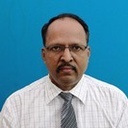Day 2 :
Keynote Forum
P Thamilselvam
Perdana University, Malaysia
Keynote: Quality of life after colostomy
Time : 10.00-10.25

Biography:
P. Thamilselvam M.s., Working as associate professor, Perdana university –royal college of surgeons in Ireland), Malaysia. He completed his UG and PG in India.rnHe is having 30 yrs of surgical experience in general and laparoscopic surgery. He also worked in Chennai Apollo Hospitals , Maldives and various universitiesrnin Malaysia .he participated in international education forum 2015 in, Malaysia he also invited as speaker to deliver medical topics in various hospitals andrnuniversities - Malaysia and chairperson for CMEs. He is visiting lecturer for surgery in johns Hopkins university school of medicine- Perdana University , Malaysia.
Abstract:
Purpose: To assess and improve the quality of life in colostomy patients who underwent colostomy due to various causes.rnMaterials & Methods: 112 patients with colostomy were identifi ed and subjected for this study for past 4 years in the HospitalrnSultanah Nora Ismail, Batu Pahat, Johor. Some patients were identifi ed from ward, some from surgical clinic and few patientsrnwere identifi ed through hospital record. Th e questionnaires were prepared by us and the study was conducted. Th e patients,rnwho were identifi ed from the record, were interviewed through telephone.rnResults: Following this study, we identifi ed that most of the patients were depressed and stressed. Th ey were also found tornbe isolated in the family and facing multiple problems. Some patients avoided certain type of food since the smell from therncolostomy bag created most of social problems. Th is study also identifi ed some family members and some people in therncommunity who were also later counseled regarding the responsibility of giving care to the colostomy patients.rnConclusion: Th is study fi nally identifi ed some good solutions which will help others and new colostomy patients to improverntheir quality of life and minimize their mental stress and social problems.
Keynote Forum
Shyam Parashar
Dammam University, KSA
Keynote: Flash Back; Surgery, then and now
Time : 09:20-09:40

Biography:
Shyam Parashar completed his Masters in Surgery from Vikram University, India in 1962. He has fi fty years of extensive experience as an active general surgeonrnand medical teacher. He is a recipient of awards in Goa as Best Clinical Teacher, 1973 and Doctor of the Year, 1975. In 1981, he joined King Faisal University inrnSaudi Arabia as professor of surgery and as Consultant Surgeon at King Fahd teaching hospital of the University. He has also held the addition appointments asrnDirector, Internship training program and later as Director, post-graduate training program in surgery. After thirty three years, retired and recognized as EmeritusrnProfessor. He played active role in establishing new colleges for Medicine, Nursing, and Pharmacy in the kingdom; and in developing undergraduate medicalrncurriculum and postgraduate training programs; and constantly reviewing them. He has seventy scientifi c publications in Indian, Saudi and International Journals.rnHe is an international editor for Journal of Medicine and Medical Sciences, and for Journal of Family and Community Medicine, of University of Dammam, SaudirnArabia. He is the recipient of many Awards like Hind Rattan Award, Bharat Gaurav Award, Medical Excellence Award and Life Time Achievement Award, Glory ofrnIndia Gold Medal and Global Indian Achievers Award at Indo-British Friendship banquet in London. Has published two books on surgery by Scientifi c PublishingrnGroup and are available on their website as E-Books, Surgery: the way I teach and Atlas of Surgery. He has also published three books on Philosophy; Twists andrnTurns of Destiny, Scattered Gems and Bikhre Moti.
Abstract:
History of medicine dates back to origin of Humans, either by Creation or Evolution, whichever one believes in. Basically rnthe primary medical needs of humans were related to just three; Relief from pain, healing of wounds and fixing of rninfirmities. Delivery and Child birth were considered as ‘Natural’, and not as medical need.rnModalities to support healing of wounds may be considered as the beginning of ‘Surgery’. Th ese modalities included mostrnprimitive remedies drawn from nature, to time tested treatments prescribed by grandmas, to scientifi cally developed adjunctsrnand now to most recent advances like stem cell research and skin banks. Job of a surgeon is to ‘Surge-on’; and to manage allrntypes of wounds, of all tissues, in all locations on the body, infl icted by external or internal and natural or iatrogenic agents.rnAn ‘Operation’ is the most essential arena of surgical practice. Operation theatre is the only theatre where there are no prior rnrehearsals; and every case is an individual test of competence of surgeon.rnI started my surgery training in 1959. More than half a century has passed since then. I have seen changes in surgical practicernin developing countries like India and Gulf countries as well as in UK and USA. What I saw and performed, as a ‘General surgeon’rnin the interiors of India can only be termed as ‘Handicap surgery’ by today’s standards. Moreover a general surgeon has to managerns urgical problems from head to foot, since even the concept of ‘Specialists’ was beyond reach. In addition, surgical problems inrntropical climates were quite diff erent and were not usually part of any surgical training program.rnFor today’s generation, it may not even be comprehensible to imagine performing surgery without disposables, clips andrnstaples, endoscopes, haemostatic glues, hot, cold and ultrasonic knives and of course, lasers. Preoperative preparations andrnpostoperative managements were primitive, to say the least. ATLS was unheard of and Critical care had no standard protocol;rnit was left to individual judgment. In spite of all this, there is always a humorous side to surgical practice, and ‘Surgeon’s jokes’rnare well known. I may touch on some. It will be my pleasure to speak about Handicap surgery in a philosophical way as a flashback of my surgical experience.
